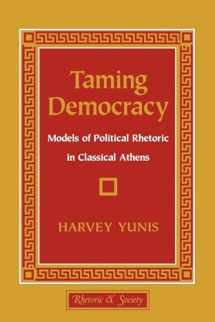
Taming Democracy: Models of Political Rhetoric in Classical Athens (Rhetoric and Society)
ISBN-13:
9780801483585
ISBN-10:
0801483581
Edition:
1
Author:
Harvey Yunis
Publication date:
1996
Publisher:
Cornell University Press
Format:
Paperback
336 pages
Category:
Greek & Roman
,
Philosophy
,
Movements
,
Political
FREE US shipping
Book details
ISBN-13:
9780801483585
ISBN-10:
0801483581
Edition:
1
Author:
Harvey Yunis
Publication date:
1996
Publisher:
Cornell University Press
Format:
Paperback
336 pages
Category:
Greek & Roman
,
Philosophy
,
Movements
,
Political
Summary
Taming Democracy: Models of Political Rhetoric in Classical Athens (Rhetoric and Society) (ISBN-13: 9780801483585 and ISBN-10: 0801483581), written by authors
Harvey Yunis, was published by Cornell University Press in 1996.
With an overall rating of 4.0 stars, it's a notable title among other
Greek & Roman
(Philosophy, Movements, Political) books. You can easily purchase or rent Taming Democracy: Models of Political Rhetoric in Classical Athens (Rhetoric and Society) (Paperback) from BooksRun,
along with many other new and used
Greek & Roman
books
and textbooks.
And, if you're looking to sell your copy, our current buyback offer is $0.3.
Description
How does one speak to a large, diverse mass of ordinary, sovereign citizens and persuade them to render wise decisions? For Thucydides, Plato, and Demosthenes, who observed classical Athenian democracy in action, this was an urgent question. Harvey Yunis looks at how these three―historian, philosopher, politician respectively―explored the instructive potential of political rhetoric as a means of "taming democracy," Plato's metaphor for controlling the fractious demos through language. Yunis offers new insights into the ideas of the three thinkers: Thucydides' bipolar model of Periclean versus demagogic rhetoric; Plato's engagement with political rhetoric in the Gorgias, the Phaedrus, and the Laws; and Demosthenes' attempt both to instruct and to persuade his political audience. Yunis illuminates both the concrete historical problem of political deliberation in Athens and the intellectual and literary responses that the problem evoked. Few, if any, other books on classical Athens afford such a combination of perspectives from history, drama, philosophy, and politics. Writing with unusual clarity and cogency, Yunis translates all texts and explains the relevant issues. His book can profitably be read by anyone concerned with the issues at the heart of classical and contemporary democracy.


We would LOVE it if you could help us and other readers by reviewing the book
Book review

Congratulations! We have received your book review.
{user}
{createdAt}
by {truncated_author}


